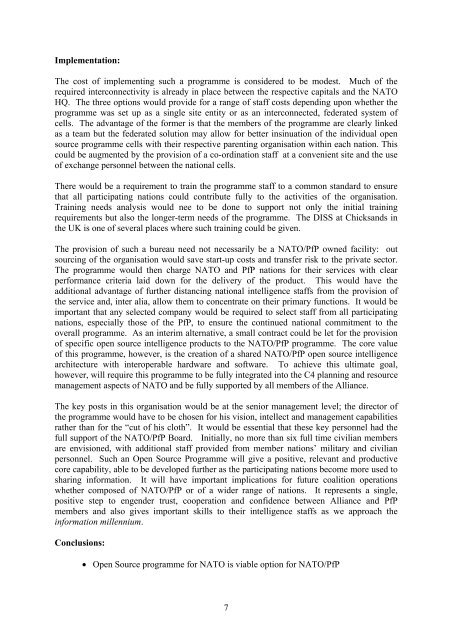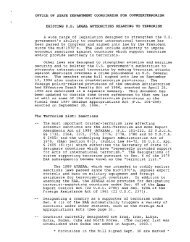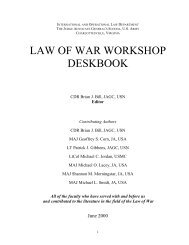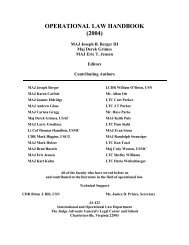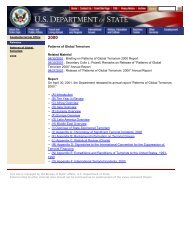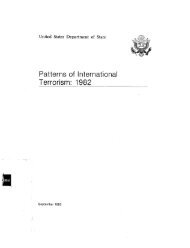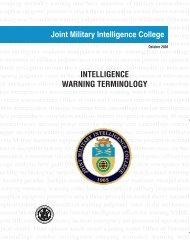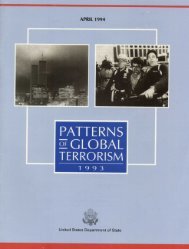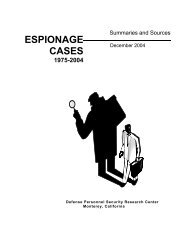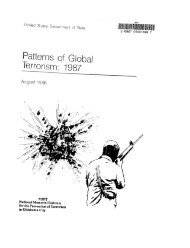OPEN SOURCE INTELLIGENCE - The Challenge for NATO - OSS.net
OPEN SOURCE INTELLIGENCE - The Challenge for NATO - OSS.net
OPEN SOURCE INTELLIGENCE - The Challenge for NATO - OSS.net
Create successful ePaper yourself
Turn your PDF publications into a flip-book with our unique Google optimized e-Paper software.
Implementation:<br />
<strong>The</strong> cost of implementing such a programme is considered to be modest. Much of the<br />
required interconnectivity is already in place between the respective capitals and the <strong>NATO</strong><br />
HQ. <strong>The</strong> three options would provide <strong>for</strong> a range of staff costs depending upon whether the<br />
programme was set up as a single site entity or as an interconnected, federated system of<br />
cells. <strong>The</strong> advantage of the <strong>for</strong>mer is that the members of the programme are clearly linked<br />
as a team but the federated solution may allow <strong>for</strong> better insinuation of the individual open<br />
source programme cells with their respective parenting organisation within each nation. This<br />
could be augmented by the provision of a co-ordination staff at a convenient site and the use<br />
of exchange personnel between the national cells.<br />
<strong>The</strong>re would be a requirement to train the programme staff to a common standard to ensure<br />
that all participating nations could contribute fully to the activities of the organisation.<br />
Training needs analysis would nee to be done to support not only the initial training<br />
requirements but also the longer-term needs of the programme. <strong>The</strong> DISS at Chicksands in<br />
the UK is one of several places where such training could be given.<br />
<strong>The</strong> provision of such a bureau need not necessarily be a <strong>NATO</strong>/PfP owned facility: out<br />
sourcing of the organisation would save start-up costs and transfer risk to the private sector.<br />
<strong>The</strong> programme would then charge <strong>NATO</strong> and PfP nations <strong>for</strong> their services with clear<br />
per<strong>for</strong>mance criteria laid down <strong>for</strong> the delivery of the product. This would have the<br />
additional advantage of further distancing national intelligence staffs from the provision of<br />
the service and, inter alia, allow them to concentrate on their primary functions. It would be<br />
important that any selected company would be required to select staff from all participating<br />
nations, especially those of the PfP, to ensure the continued national commitment to the<br />
overall programme. As an interim alternative, a small contract could be let <strong>for</strong> the provision<br />
of specific open source intelligence products to the <strong>NATO</strong>/PfP programme. <strong>The</strong> core value<br />
of this programme, however, is the creation of a shared <strong>NATO</strong>/PfP open source intelligence<br />
architecture with interoperable hardware and software. To achieve this ultimate goal,<br />
however, will require this programme to be fully integrated into the C4 planning and resource<br />
management aspects of <strong>NATO</strong> and be fully supported by all members of the Alliance.<br />
<strong>The</strong> key posts in this organisation would be at the senior management level; the director of<br />
the programme would have to be chosen <strong>for</strong> his vision, intellect and management capabilities<br />
rather than <strong>for</strong> the “cut of his cloth”. It would be essential that these key personnel had the<br />
full support of the <strong>NATO</strong>/PfP Board. Initially, no more than six full time civilian members<br />
are envisioned, with additional staff provided from member nations’ military and civilian<br />
personnel. Such an Open Source Programme will give a positive, relevant and productive<br />
core capability, able to be developed further as the participating nations become more used to<br />
sharing in<strong>for</strong>mation. It will have important implications <strong>for</strong> future coalition operations<br />
whether composed of <strong>NATO</strong>/PfP or of a wider range of nations. It represents a single,<br />
positive step to engender trust, cooperation and confidence between Alliance and PfP<br />
members and also gives important skills to their intelligence staffs as we approach the<br />
in<strong>for</strong>mation millennium.<br />
Conclusions:<br />
• Open Source programme <strong>for</strong> <strong>NATO</strong> is viable option <strong>for</strong> <strong>NATO</strong>/PfP<br />
7


